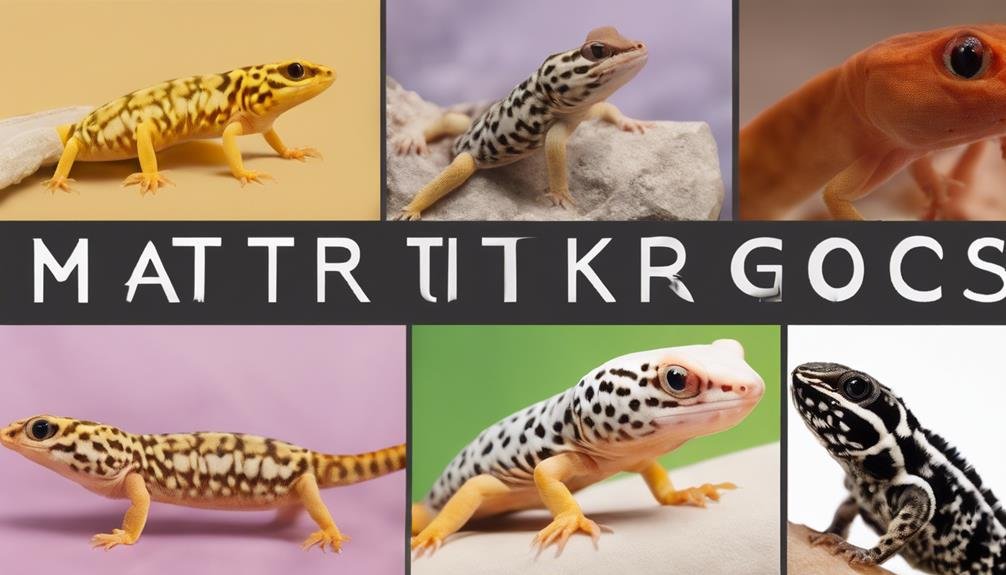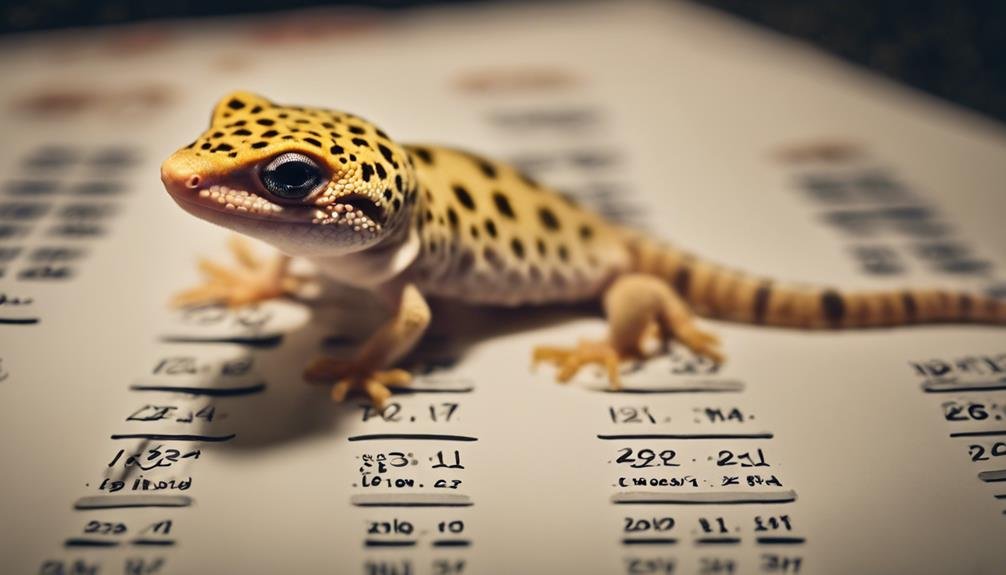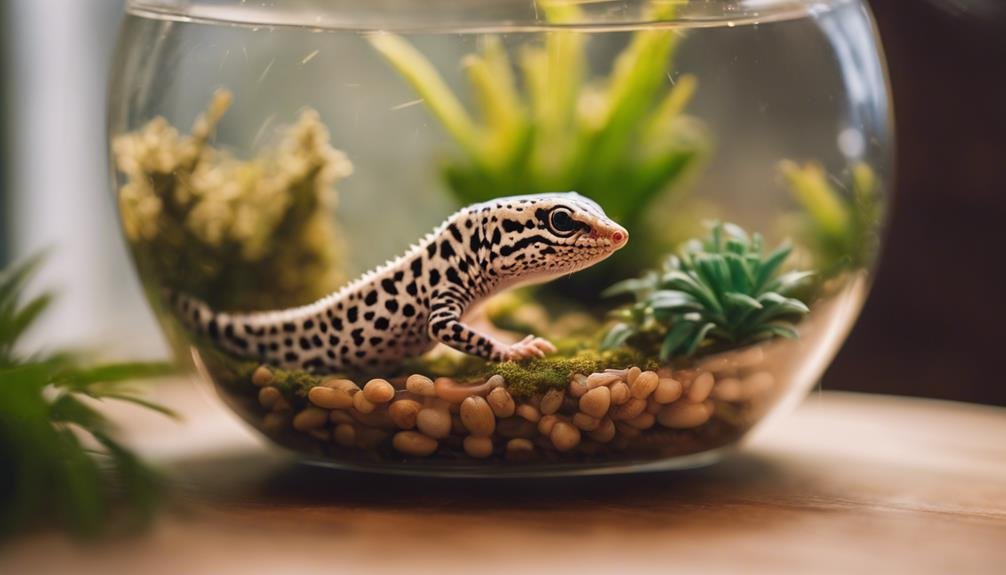If you’re wondering whether you can treat your leopard gecko to Dubia roaches, you’ll be pleased to know that these insects are not only safe but highly beneficial for your pet. Packed with protein, vitamins, and minerals, they support your gecko’s health and mimic their natural diet, encouraging their instinctive hunting behavior. However, before you start incorporating these roaches into their diet, there are a few key considerations to keep in mind, from feeding techniques to frequency, to make certain your gecko reaps the benefits without any downsides. Let’s explore what makes Dubia roaches the special treat they are, and how you can safely introduce them to your leopard gecko’s meal plan.
Key Takeaways
- Leopard geckos can safely eat Dubia roaches as a protein-rich part of their diet.
- Dubia roaches provide essential nutrients like calcium, vitamins A and D3, supporting gecko health.
- Offering Dubia roaches stimulates a leopard gecko’s natural hunting instincts, enhancing physical and mental activity.
- Feeding Dubia roaches 2-3 times a week is recommended for a balanced diet in leopard geckos.
- Due to their low chitin content, Dubia roaches are easily digestible, reducing the risk of impaction in leopard geckos.
Dubia Roaches for Leopard Geckos
Dubia roaches often serve as an ideal dietary choice for leopard geckos due to their high protein content and essential nutrients. These feeder insects boast a remarkable 54% protein content, eclipsing other common feeder insects like crickets and mealworms in nutritional superiority. For your gecko, this means they’re getting a meal that’s not just filling but also incredibly beneficial for their overall health and growth.
Packed with calcium, vitamins A, and D3, Dubia roaches support strong bone development and a robust immune system in geckos. Unlike some other feeder options, they’re safe, quiet, and virtually escape-proof, making them a hassle-free choice for you. They don’t carry the risk of annoying noise or unpleasant odors that can sometimes accompany other types of feeder insects.
Incorporating Dubia roaches into your gecko’s diet isn’t just about the nutritional value; it’s also about enhancing their natural hunting instincts. Offering these roaches can stimulate your gecko, encouraging natural behaviors that keep them physically and mentally active. This aspect of feeding isn’t just important—it’s vital for maintaining a happy and healthy gecko.
Feeding Techniques
After understanding the nutritional benefits of Dubia roaches for your leopard gecko, let’s explore how to effectively feed them to stimulate your pet’s hunting instincts and make sure they’re engaged and healthy. Scatter these feeder insects around the tank to mimic their natural hunting environment. This not only provides mental stimulation but also encourages physical activity as your gecko hunts its prey.
Consider creating an obstacle course with natural materials, placing Dubia roaches at the end as a reward. This setup promotes problem-solving and keeps feeding times interesting. Alternatively, use a special feeder toy designed for Dubia roaches to encourage interaction. This method reduces boredom and stress, ensuring your leopard gecko remains happy and active.
Dimming the lights slightly during feeding times can enhance your gecko’s natural hunting behavior, making the experience more engaging for them. Always choose feeding techniques that prioritize your gecko’s safety and enjoyment, ensuring they remain stimulated both mentally and physically.
Nutrient Profile


Understanding the nutrient profile of Dubia roaches is essential, as they’re packed with protein and essential vitamins that support your leopard gecko’s health and vitality. With a protein content of around 54%, Dubia roaches stand out as a top-tier source of the necessary building blocks for muscle development and maintenance in your gecko. This high protein content guarantees that your pet is getting a significant amount of its dietary needs met with every meal.
Moreover, these roaches are an excellent source of calcium, an indispensable mineral for ensuring strong bone health in leopard geckos. This aspect is particularly significant, as calcium deficiencies can lead to serious health issues in reptiles. Alongside this, Dubia roaches provide critical vitamins A and D3, which are essential for maintaining good vision, skin health, and aiding in the efficient absorption of calcium, enhancing overall health and wellbeing.
Compared to other common feeder insects like crickets and mealworms, Dubia roaches offer superior nutritional value, making them a more beneficial choice for your gecko’s diet. Feeding Dubia roaches to your leopard gecko not only enhances their hunting instincts but also guarantees they’re receiving a balanced diet that supports their growth, health, and longevity.
Health Considerations
While the nutritional benefits of Dubia roaches for leopard geckos are evident, it’s also important to take into account health implications when incorporating them into your pet’s diet. Feeding Dubia roaches to your gecko can be a good way to guarantee they’re getting a balanced diet, but it’s important to be mindful of a few key health considerations.
- High Protein Content: Dubia roaches are high in protein, which is great for your gecko’s health. However, balance is key to preventing health issues related to excessive protein intake.
- Calcium to Phosphorus Ratio: They offer a good source of calcium, essential for bone development and strength, helping to stave off metabolic bone disease.
- Low Chitin Content: With low chitin content, Dubia roaches are easier for geckos to digest, reducing the risk of impaction—a common health issue in gecko feeding.
- Vitamins A and D: These roaches are rich in vitamins that support metabolic functions, contributing to overall good health.
Feeding Frequency


Determining the right feeding frequency for your leopard gecko involves considering their age, size, and specific health needs. Dubia roaches, being one of the best staples in a gecko’s diet, can be offered 2-3 times a week. This frequency guarantees that your gecko maintains a balanced diet without the risk of overfeeding, which could lead to obesity and other health complications.
For younger geckos, their rapid growth requires more frequent feedings. It’s a good rule of thumb to offer them meals more often than you’d an adult. This supports their developmental needs, ensuring they receive the necessary nutrients for healthy growth. As geckos mature, their eating habits change. Adults require fewer feedings, and adhering to the 2-3 times a week schedule for Dubia roaches as a feeder is generally sufficient.
Monitoring your gecko’s body condition is essential for adjusting their feeding schedule accordingly. If you notice signs of weight gain, it might be time to cut back on the frequency. On the other hand, a gecko that appears underfed might benefit from additional meals. Tailoring the feeding frequency to your gecko’s individual needs is key to their health and wellbeing.
Storage Solutions
When it comes to storing Dubia roaches for your leopard gecko, you need to focus on maintaining the ideal temperature range and humidity levels. Ensuring the right conditions will keep your roaches healthy and ready to be a nutritious meal.
Let’s look at how you can control temperature and humidity effectively in your storage setup.
Ideal Temperature Range
To guarantee your Dubia roaches remain a healthy food source for leopard geckos, it’s important to store them within the ideal temperature range of 75-85°F. Keeping them within this range ensures they stay active, healthy, and nutritious, making them excellent feeder insects.
Here are key points to remember:
- Avoid extreme temperatures below 60°F or above 95°F to prevent stress or death.
- Ideal conditions keep Dubia roaches beneficial for your leopard gecko.
- Temperature fluctuations can negatively affect their lifespan and nutritional value.
- A stable temperature range is vital for maintaining Dubia roaches as a nutritious food source.
Humidity Control Methods
Managing humidity levels is essential for keeping your dubia roaches healthy and thriving in their enclosure. You’ll need a well-ventilated container with a secure lid to effectively control humidity.
Utilize substrates like egg crates or paper towels to soak up any excess moisture, preventing your dubia roaches from drowning or mold from growing. It’s important not to over-saturate them with water.
Keep an eye on the humidity levels with a hygrometer, ensuring they stay within the 40-60% range recommended for dubia roaches. Should the humidity climb too high or drop too low, adjust the ventilation and moisture levels accordingly.
This will create the perfect environment for your dubia roaches’ health and longevity.
Other Gecko Species


While you’re familiar with leopard geckos enjoying Dubia roaches, it’s crucial to mention that other gecko species like Crested Geckos, African Fat-Tailed Geckos, and Gargoyle Geckos also thrive on these nutritious insects.
Each species has unique dietary needs, making Dubia roaches a versatile treat that can supplement their diets with essential nutrients. Always refer to care guides or a vet to confirm that these roaches meet the specific nutritional requirements of your gecko.
Diet Variations Across Species
Understanding the dietary preferences and requirements of various gecko species is essential for their health and well-being. While you might be exploring if leopard geckos can eat Dubia roaches as a special treat, it’s important to recognize that not all geckos will thrive on the same diet.
- Crested Geckos: Prefer fruit-based diets in captivity.
- African Fat-tailed Geckos: Benefit from a diet of insects like mealworms and crickets.
- Mediterranean Geckos: Consume a variety of insects, including spiders and ants.
Unique Nutritional Needs
To ensure your gecko thrives, it’s important to customize their diet to meet their unique nutritional needs, which vary greatly across species. While leopard geckos might enjoy Dubia roaches, other geckos may require diets with higher or lower levels of calcium, protein, or fat. As geckos age, these needs can change, leading to a loss of appetite if their diet doesn’t adjust.
It’s a good idea to research or consult with a reptile veterinarian to understand what each species needs for peak health. Providing a balanced and species-appropriate diet isn’t just beneficial; it’s essential for their well-being. Remember, what works for leopard geckos may not suit another gecko species perfectly.
Can Dubia Roaches Be a Suitable Treat for Crested Geckos as Well?
Yes, dubia roaches can be a suitable treat for crested geckos along with other crested gecko food options. These roaches are high in protein, making them an excellent addition to a crested gecko’s diet. However, it is important to offer a variety of foods to ensure a balanced nutrition for your pet.
Frequently Asked Questions
Can I Feed My Leopard Gecko Dubia Roaches?
Yes, you can feed your leopard gecko Dubia roaches! They’re packed with nutritional value, offering high protein and essential vitamins. However, consider the size of the roaches compared to your gecko to make sure they’re manageable.
Feeding frequency should be moderate to maintain a balanced diet. Don’t forget to coat the roaches with a calcium or vitamin supplement to boost their nutritional content further. This makes Dubia roaches a fantastic treat for your gecko.
What Is a Leopard Geckos Favorite Treat?
Your leopard gecko’s favorite treat might vary, but Dubia roaches are a top choice due to their nutritional benefits.
Consider mealworm nutrition and cricket alternatives when planning your pet’s diet.
Regular feeding with nutritional supplements guarantees they’re getting all they need.
While Dubia roaches are a hit, it’s important to keep feeding frequency in mind to maintain a balanced diet.
This approach keeps your gecko healthy and happy.
What Is the Best Roach for Leopard Geckos?
When choosing the best roach for your leopard gecko, consider roach nutrition, handling tips, feeding frequency, and size considerations.
Discoid and B. lateralis roaches are top picks due to their nutritional value, suitable size, and activity levels.
You’ll want to handle them easily for feeding, stick to a healthy feeding schedule, and make sure the roach size matches your gecko’s size to avoid digestion issues.
These factors guarantee your gecko stays happy and healthy.
Can Dubia Roaches Cause Impaction Leopard Gecko?
You’re wondering if Dubia roaches can cause impaction in leopard geckos. Well, selecting the right roach size is essential to avoid this issue. Proper hydration plays a key role in digestion, making these roaches a good choice due to their high moisture content.
Also, choosing the right substrate can minimize impaction risks. Following these impaction prevention tips guarantees your gecko stays healthy while enjoying these nutritious treats.
Conclusion
To summarize, you can definitely treat your leopard gecko to Dubia roaches, adding valuable nutrients and excitement to their diet. By adopting proper feeding techniques and keeping an eye on health considerations, you’ll guarantee they’re getting all the benefits without any downsides.
Remember to feed them these roaches in moderation and look into suitable storage solutions to keep the insects fresh.
While Dubia roaches are a great option for leopard geckos, they can also be a nutritious treat for other gecko species.


